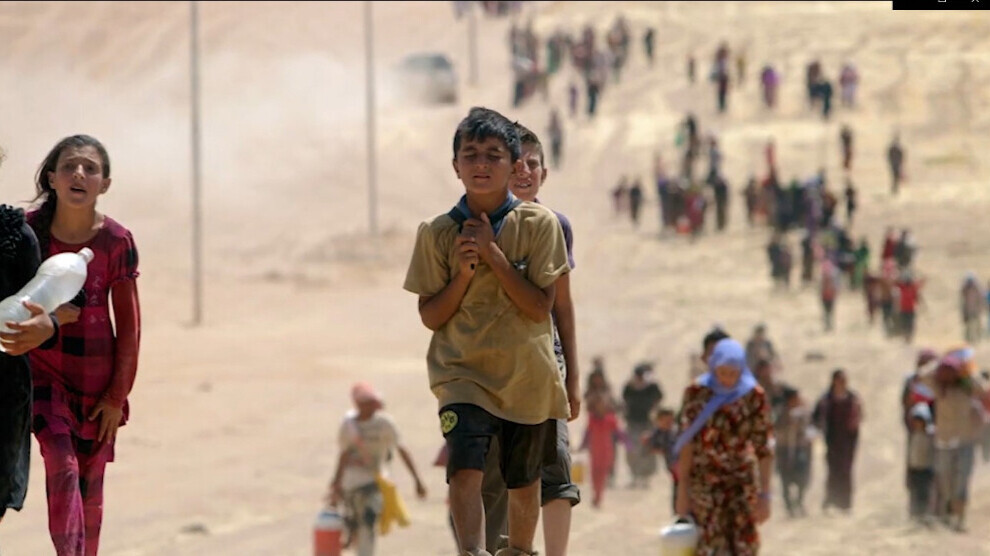Telling the story of the genocide in Shengal
Article penned by internationalists to mark the 10th anniversary of the genocide and to honor the revolution in Shengal.
Article penned by internationalists to mark the 10th anniversary of the genocide and to honor the revolution in Shengal.

Daesh. It's a name not unfamiliar to our ears, to those of us from the international community. ISIS, the Islamic State or sometimes simply referred to as "terrorists", we think immediately of men dressed in black, looting, killing and terrorizing people in their path. But do we really know any more than that? Do we know the history of the lands and peoples who have suffered attacks and sometimes even had to live under this organization's political and ideological system?
Among these peoples is the Êzidi (Yazidi) community. A people with beliefs and customs dating back thousands of years, long before the birth of Jesus Christ or Mohammed, and still today the bearers of ancient traditions and cultures. Today, most of them live in Iraqi Kurdistan (Bashur in Kurdish) and celebrate God and his representative on earth: the Peacock Angel. In the course of history, they have suffered more than 74 genocides, which have only reduced and emigrated their people. Today, they number only a few hundred thousand, many of whom live far from their homeland.
Exactly 10 years ago, in 2014, the Islamic State in Iraq was expanding and headed towards Mosul. Populations were massacred or forced to follow Islamic State rules, museums and archaeological sites dating back to the Neolithic period were looted and destroyed, and the group continued its terror route towards the Shengal Mountains (Sinjar) to replicate the same on the people who live there, the Êzidis. Daesh entered the village of Siba Sheikh Kedr and the peshmergas, the army of Barzani's KDP (Iraqi Kurdistan) which controlled Shengal at the time, disarmed the population and fled. The Êzidis, deprived of armies and weapons, put up unfailing resistance to the invasion. Their martyrdom and determination are still celebrated and remembered today. Their rebellion gained precious hours in warning the surrounding villages and enabling the population to flee, but also gave an important message to their people, for they embodied the strength to defend their land and became a symbol of resistance.
On August 3, 2014, Daesh took the town of Shengal. Some tried to flee into the mountains, on foot, under the scorching August sun, without food or water, including young children and the elderly. Others were caught or killed. Men, young and old, were executed in the thousands and thrown into mass graves, women were separated from their families, sorted and taken away to be sold and forcibly married to Daesh soldiers. The HPG gerilla and the YPG (People's Defense Units) and YPJ (Women’s Defense Units) of Rojava (now called DAANES, the Democratic Autonomous Administration of North and East Syria) rushed into the region to open a protective corridor into Rojava to support the evacuation of the population. After many months of fighting, they succeeded in liberating Shengal with the help of the local people. To this day, thousands of Êzidis are still missing, lost in the hands of Daesh or have yet to be discovered in lost mass graves.
Telling the story of the genocide means preventing others from telling it, it means knowing your enemy, it means preventing them from forgetting or denying it, like Erdogan's government, which to this day denies and forbids discussion about the genocide of the Armenians in 1915. Telling the story of the genocide also means telling the story of a people's resistance and raising the question of reconstruction and rebuilding. What kind of healing is possible in the face of collective trauma? To emerge from their horrors, the Êzidis have chosen a revolutionary path: that of organizing themselves, protecting themselves and choosing their own destiny, rather than waiting for others - the peshmergas, the Iraqi state - to do so, betraying them and abandoning them once again.
With the guidance of Abdullah Öcalan's paradigm, on August 3, 2015, one year after the genocide, Shengal’s armed self-defense forces, the YBŞ (Shengal Defense Units) and YJŞ (Shengal Women's Units), were created. At the same time, a process of building democratic and political autonomy was set in motion, and over the past 10 years the population has been training to be armed against external attacks, both militarily and socially.
Today, hundreds of young women are joining the ranks of the YJŞ. There, they learn their stories, seek democratic, socialist solutions to the constraints of their region to build a free and ethical political system, adapted to their people, culture and tradition. Women and the population are becoming increasingly involved in the various civil structures of the Shengal autonomous administration (MXDS) to participate in the revolutionary process. The autonomous administration has open assemblies and co-representatives of the administration are elected for two-year terms. A structure for the Yazidi Women's Freedom Movement, TAJÊ, as well as cultural and ecological committees, autonomous youth structures and media committees (such as ÇIRA TV) have also been set up to work on a variety of themes and in a number of areas to promote the population's political independence. Each of these structures is democratically organized, developing political education through various academies and projects.
The Êzidis of Shengal have stated loud and clear that they are resisting, that they are still there and that they will never again let genocide befall them. To speak of the genocide suffered by the Êzidis is also to echo the ongoing genocide of the Palestinian people. To speak of these events is to refuse passivity and silence. International solidarity is more than necessary. To oppose the policies of extermination, from Daesh to imperialism, the strength of peoples organized for themselves and the possibilities of lasting democratic solutions for the Middle East.
Long live the people's autonomy in the face of genocidal policies!
Bijî berxwedana Şengalê!